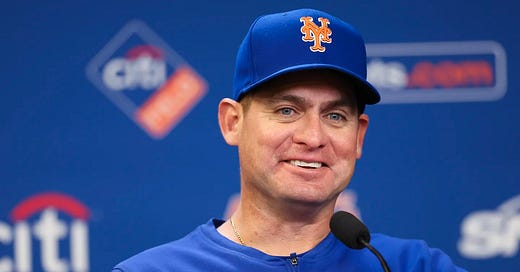Carlos Mendoza Needs To Beat Goliath
The skipper is showing promising signs that he knows how to lead this team to victory
Here are two games to compare and contrast.
The first: July 23, 2022, a 2-1 loss to the Padres. The second: August 15, 2024, a 7-6 loss to the A’s.
In the first, the Mets trail 2-0 going to the 9th inning, but with two outs, J.D. Davis’ RBI single makes it 2-1 and puts the tying run on third. Up next, though, Tomás Nido pops up to second, and the Mets lose.
Jeff McNeil, in the midst of a season that will end with him winning the batting title, was available to pinch-hit, Buck Showalter says after the game — but “Nido was a good option too.”
In the second, the Mets trail 7-6 in the bottom of the seventh, and have men on first and second with one out. McNeil is due up, and he’s looked solid at the plate in two long at-bats, but Carlos Mendoza chooses to pinch-hit Francisco Alvarez, who has been slumping, but who also looked great at-bat the night before.
Alvarez, in a weird little mishap of a play, is called out when he hits a chopper in front of the plate and walks directly into it. Alvarez later makes the last out of the game, a 99.9 mph lineout to center.
McNeil is a former batting champion, but he’s also in the middle of a down year. He’s a lefty batting against a lefty. Alvarez is certainly no batting champion, but he’s a righty who’s been hitting the ball well. The conventional decision was probably to let McNeil hit. The move itself is debatable, but what’s not is this: Mendoza assessed the situation, decided which course was the winning one, and followed it, conventional or not.
Buck chose not to make the move. Mendoza pulled the trigger. The results were the same — but the mindsets were vastly different, and provide a study in just why Mendoza is the right person to lead the 2024 Mets.
“Status quo bias is a cognitive bias based in emotion,” writes Penn’s Wharton School of Business in an online primer. “Change naturally invites risk, and people may be uncomfortable putting themselves in situations where the outcome is uncertain.”
Status quo bias is everywhere in baseball, from the long-term (for decades before the shift was banned, teams played their infielders in the same positions, even though much more effective positioning was possible) to the short term (leaving a pitcher in a few batters too long, convinced that a reliever is riskier). And the reason it’s called “bias” is that it’s incorrect. There’s nothing inherently good about the status quo. If a specific status quo is good — if you’ve got Mike Piazza at the plate or Tom Seaver on the mound — then of course it makes sense to maintain it. But just being the status quo doesn’t, in itself, make a situation worth maintaining. If a situation isn’t as favorable as it could be, the best move — obviously — is to change it.
“David can beat Goliath by substituting effort for ability,” Malcolm Gladwell noted in a 2009 feature in The New Yorker. “And substituting effort for ability turns out to be a winning formula for underdogs in all walks of life.”
On a baseball field, “effort” comes from everywhere — including the manager’s office.
The Mets aren’t a bad team; they’re above .500 and competing for a playoff spot. But within that competition, they’re an underdog, more of a David than a Goliath. So how do they close the gap and beat the more talented Phillies, Dodgers, D-backs, Padres?
There are two ways. First, of course, there’s the natural element of luck, the unavoidable fact that any team can win a baseball game on any given day. But second, they beat more talented opponents by getting more out of the talent they have. Being bold. Substituting effort (including managerial effort) for ability. And that might mean pinch-hitting for McNeil, even if McNeil has taken some nice at-bats and Alvarez is in a bit of a slump.
The only problem with the way Mendoza is operating, really, is that he hasn’t taken it far enough.
The Mets need to beat teams better than they are, so they need to work harder with better tactics. More guerrilla warfare: suicide squeezes, high-effort pickoff plays, aggressive sends, a manager unafraid to be unorthodox and buck the status quo.
“The political scientist Ivan Arreguín-Toft recently looked at every war fought in the past two hundred years between strong and weak combatants,” Gladwell writes. “The Goliaths, he found, won in 71.5 per cent of the cases … [but] what happened, Arreguín-Toft wondered, when the underdogs likewise acknowledged their weakness and chose an unconventional strategy? He went back and re-analyzed his data. In those cases, David’s winning percentage went from 28.5 to 63.6. When underdogs choose not to play by Goliath’s rules, they win, Arreguín-Toft concluded, ‘even when everything we think we know about power says they shouldn’t.’”
The Mets are a David battling Goliaths — they can succeed, but only if they do it right. Work both smarter and harder. Winning in a diabolically tough Wild Card race will require ruthless efficiency. That means avoiding fallacious, conventional thinking and focusing without fail on one thing: what will best help the team win?
To make the playoffs, that boldness is what the 2024 Mets will need — and it looks like Carlos Mendoza knows it.




